What is intersectionality?
Understanding privilege through intersectionality
Life is rarely binary by nature, which is true when understanding power, privilege, intersectionality and oppression.
Often, folks who experience oppression in some parts of their lives are hesitant to call themselves privileged in other areas. And we get it—this is confusing if you haven't had to unpack it before.
The wheel of power is a helpful tool (though not perfect) for understanding how individuals can experience both privilege and oppression in compounding ways.
The closer you are to the centre, the more privilege you have*
*But remember these categories don't carry equal weight, socioeconomic, political and historical factors all shape individual experiences of privilege & oppression.
On intersectionality, power & privilege
Meet Patrick:
Let's start with Patrick. Patrick is a white cis-man born and raised in Canada and can trace his lineage back several generations.
His parents are middle-class, and his dad co-signed his student line of credit for university, which Patrick is still paying off today.
Patrick is also a gay man and has faced significant prejudice. Patrick is out, but since he works with finance bros on Bay Street, he often minimizes his full self to work in a very (toxic) bro-ey space.
Patrick has faced discrimination as a gay man and privilege as a white cis-man. He could not afford to pay for university, but also as the child of a middle-class white family, Patrick was able to get a student line of credit.
Meet Priya:
Priya is a south-Asian, cis-woman who is straight. Her parents immigrated to Canada and gave birth to Priya here.
Priya's parents started a business when she was young, with a few franchise locations today, making her family upper-middle class.
Priya grew up in a white, affluent neighbourhood and faced considerable overt and covert racism. In addition, Priya is deaf and has had to navigate a world designed for people who can hear.
Priya's skin colour is always visible, and she faces discrimination and racism. While she has to face a world designed for people who can hear, she has also been fortunate to have wealthy parents whose resources make support services accessible to her.
On intersectionality, power & privilege
Intersectionality is a lens which helps us understand how multiple forms of power can overlap - but it doesn't mean aspects (e.g. race, body size, class) are weighted equally.
Historical, socioeconomic, and political aspects all play a role in the experiences of privilege and oppression in a place at a given time. For example, the historical legacy of slavery in the United States and Canada and the anti-Blackness that is still steeped within its systems contribute uniquely to Black folks' oppression.
Similarly, intersectionality helps us understand how multiple forms of oppression can take place at once, for example the crisis of Missing and Murdered Indigenous Women and Girls in Canada is an issue concerning systemic anti-Indigenous hate as well as gender-based violence.


